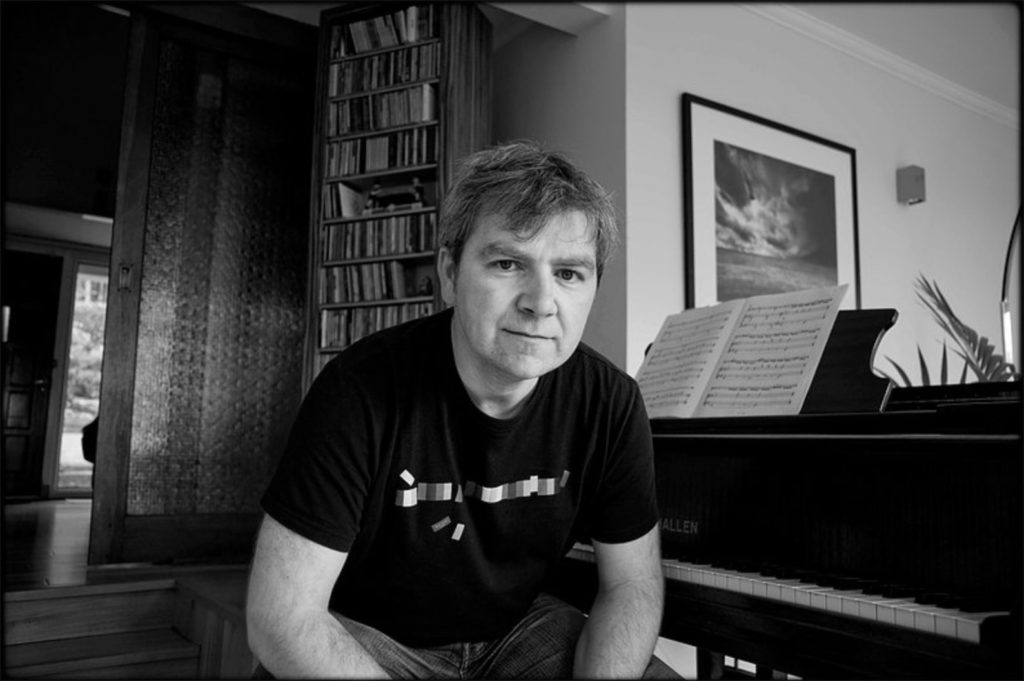Malcolm is an established Classical and also an award winning Film/TV composer from Fife. He composes predominantly for Film & TV, the latter in Drama & Documentary. His most notable work was for “Harry Price – Ghost Hunter”, “Whitechapel – Series II”, “Unforgiven”, “Michael Palin & The Mystery of the Hammershoi”, to name but a few and has also worked with the Royal Scottish National Orchestra, Scottish Opera, The Brno Philharmonic Orchestra, Moscow Contemporary Music Ensemble, again, to name only a few.
Malcolm’s pre-classical music journey led him to play in bands, as a guitarist, pianist and composer in Harvest, from there to “JEEP” then onto founding and performing with Ricky Ross in Deacon Blue, before “Raintown” and Deacon Blue hit the big time, as he left to pursue other music projects, collaborating with Stuart Duffin and Carol Moore, in The Moors.
With a music career as rich and varied as his output over the years, we caught up with Malcolm to find out more…
Q: What brought you to music, was there a divine moment with the universe showing you a path choice or did your musical journey happen gradually ?
“It happened gradually: I had piano lessons until the age of 14 – mostly taught by a nun in the local convent – and when I achieved grade 5, I gave it up and bought a guitar. At the time I didn’t enjoy playing piano much, but the guitar nurtured my love of music.”
Q: Where were you born and did your childhood shape your music in any way ?
“I was born in Fife, and yes during my short spell of music education, I guess you could say some ‘shaping’ took place. I sang quite a bit, including in an opera for young people called ‘The Little Sweep’ written by Benjamin Britten and Peter Pears, who actually came to see the performance.”
Q: Classically trained, how did you become familiar with and use DAW’s to aid in composing ?
“I discovered midi technology and started to record pop arrangements into a keyboard in the early ‘80s and by the end of the ’80s was using midi to write and record with other musicians. With my band ‘The Moors’, the entire album was pre-arranged using a midi sequencer and when the band came to an end I switched to using Cubase and started recording classical ideas.”
Q: What was your first DAW and what do you use now (current set up) ?
“My current setup is Nuendo, which is perfect for Film and TV composition, mixing and music / album production.”
Q: You have a plethora of exceptional work in Film/TV, Classical and also in the world of Pop/Rock, do you have any preference, or do you treat each project on its own merit when they present themselves to you ?
“I like the diverse challenges of working across different genres and every project requires its own approach. I try to choose projects that excite me, because it makes it so much easier to commit fully to doing a good job! It is rather special to write for a large orchestra and then hear your work performed.”
Q: I imagine you have regular requests to become involved in Film/TV or other projects. What draws you to any given one – is there a certain drama or darkness which attracts or resonates. And how do you decide, for instance, do you ask to see a script, or are you more interested in seeing some visuals first ?
“Well, over the years I do seem to have specialised a bit in dark, atmospheric and moody dramas, so maybe I am attracted to them without realising it. Inevitably you tend to get job offers that relate to your previous work, so my track record is pretty strong in dark drama and challenging documentaries. I think you often find that the jobs choose you and I’ve not got round to tracking the ones I turn down, to see if there is a trend in my choices. From reading a script, it can be hard to know what a film will look like, the result is so dependent on the director’s vision. So I tend to judge a project based on who is involved rather than anything else.”
Q: Your work has been featured in countless, well known Film/TV features/dramas, you’ve created work which has been performed by the RSNO, you’ve written for and produced artists, you’ve arranged and produced score for Pop/Rock music, Theatre/Visual Artists, how on earth do you find time and what has been your biggest thrill and also biggest challenge ?
“I only take on one project at a time, since the TV work is very intense i.e. (14 hours days are normal). Also, I’ve learned to work quickly, which helps! Biggest challenge in the early days was working as a string arranger for David Byrne on a film score, and in terms of thrill – writing and recording with the RSNO, the BRNO Philharmonic and the Orchestra of Scottish Opera.”
Q: As an Composer/Musician, who inspired you initially, who inspires you now ?
“In the early days, I was inspired by American west coast music, including the Jazz Crusaders – also loved BB King, Bruce Cockburn and Larry Carlton. Still keen on Americana – I toured with the Willard Grant Conspiracy a few years back. I also love classical composer Arvo Part and film composer Mychael Danna.”
Q: What advice would you give to your younger self, say, if a DeLorean pulled up outside, ready to go back ?
“Don’t sell that Gibson SG guitar !”
Q: What Film or TV scores have you admired and what is your favourite film or genre ?
“The Mychael Danna score for the “Ice Storm” is one that stands out. I like quirky films.”
Q: What’s your work flow process when you start work on a Film or TV project ie Do you watch the visuals over and over as well as acquire all the Film/TV Brief info you need from the Director. Are you always in communication with a Director and do you say, “first draft” ideas and send them to the Director. How do you approach it then take it forward ?
“I usually start with a discussion with the director, once I have watched the (sometimes incomplete) film a few times. I’ll then send ideas, usually for the start of the film and that will start a discussion and lead onto revisions and further music ideas. I don’t like to supply rough mixes – I tend to always provide things at broadcast quality. Every director is different in their approach to music and how they like to work with a composer: some might provide up to a page of notes on a 30 second cue, others will just give some general comments and be more hands-off.”
Q: For someone who has composed/written so much within Film/TV, Orchestral/Classical, Theater etc…what would you like to become involved in, ie concentrate on bigger scores for more feature films or focus more on Classical ? What does someone at your level, professionally, aspire to ?
“I’m keen just to continue writing for TV/film and to be involved with other projects that excite and challenge me. I have a couple of personal projects in the air at the moment, so am trying to be patient about how to make them happen.”
Q: What advice can you give to composers who are just starting out or who are at a crossroads and don’t know how to take their career forward or even step into a career in Film/TV composing, how can they better their chances of success or getting their music placed on productions ?
“If you are just starting out and want to be a media composer, my advice would be to try and get to know people who make films / games, and where possible collaborate on speculative projects to get experience and make contacts that might be useful in the future. Without a network of some kind, it’s almost impossible to get work. As for getting music placed in productions, the same applies. However, it’s pretty difficult these days, because everyone is chasing this goal: you are competing not only with other media composers, but all the publishers and the pop world too. You need contacts in the industry to help you get noticed.”
Q: I’ve heard it said that composers/music creators would make good Film/TV Editors, as the processes are similar with fluency and continuity, constructing a landscape etc….and you appear to have a love of photography/the visual field. Have you ever toyed with the idea of Directing or Editing ?
“No – I’d be a terrible Director / Editor, they have very specific skills which I just don’t have. I’m in awe of those that do these jobs well.”
Q: What are your preferred sample libraries and why ?
“Some of the Spitfire samples are good – some nice realism amongst the libraries – although they are expensive. I tend to purchase a library for a particular project and then of course, if it’s good, hang on to it! I also create my own library of sounds for each project, which is fun and can help in the development of a distinctive sound.”
Q: When mixing, do you have any preference to balancing the mix ie (in FilmScore or Classical pieces, do you follow a Hi to Low mix, with Contras/Cellos/Bass to the right and hi end panned to the left, using the Orchestral stage layout ?
“When I’m mixing an orchestra for TV, I do not follow the convention of placing the instruments across the stage, since the placement of sound in film is crucial and relates to the drama. So I mix according to the picture I’m looking at.”
Wishing Malcolm continued success in 2020….
By Pete Carroll (March 2020)



